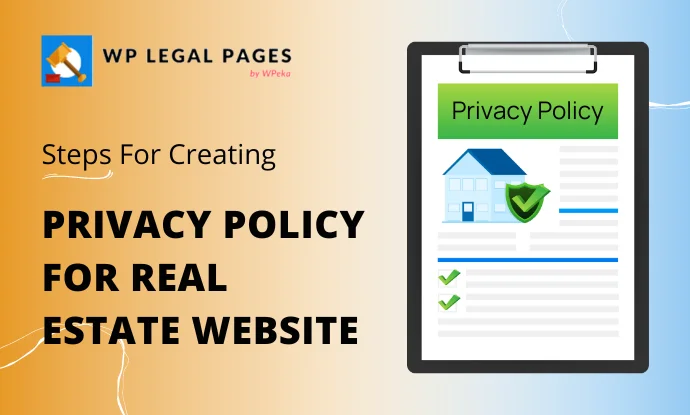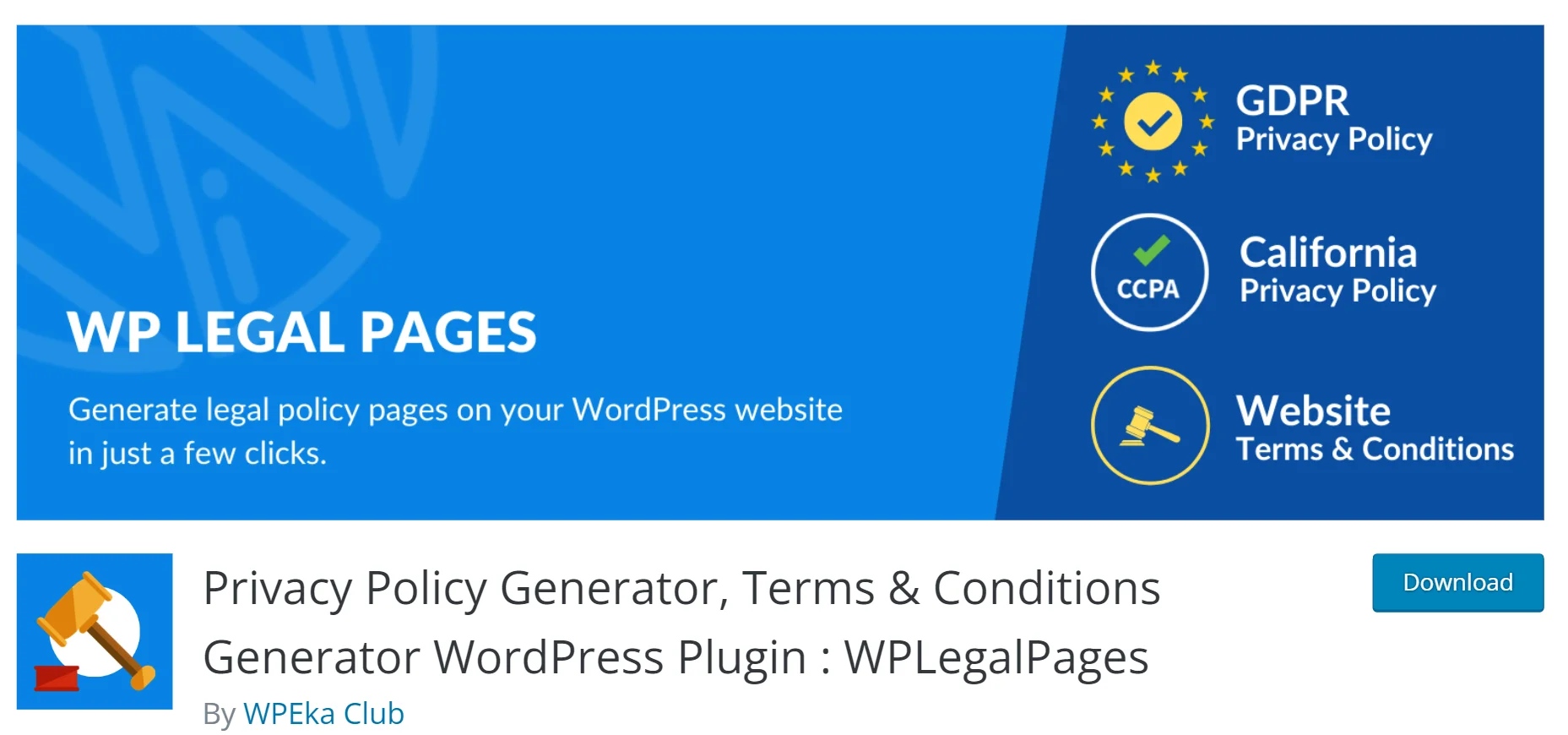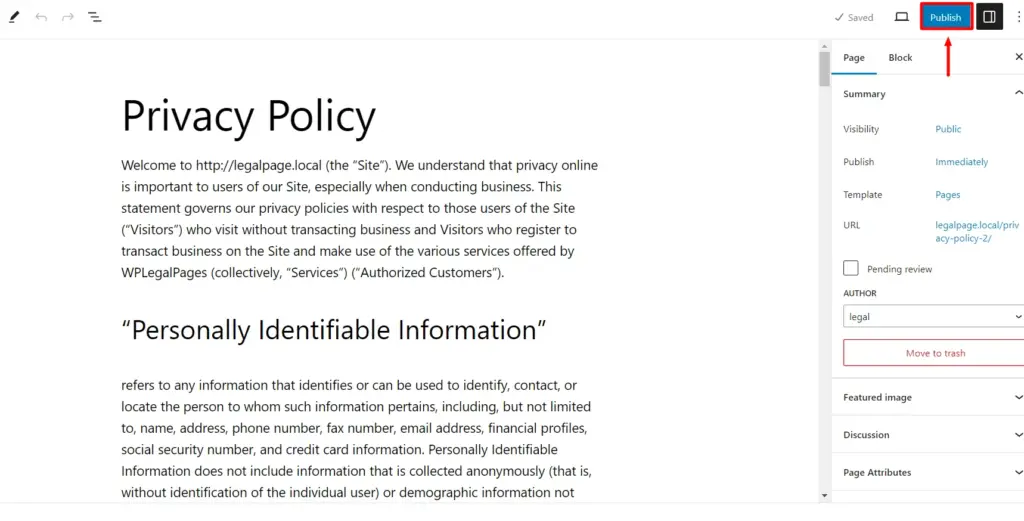How To Create a Privacy Policy For Real Estate Website

Are you thinking about making a privacy policy for your real estate website?
A real estate privacy policy is crucial for agents and professionals. It enables communication with clients about the personal information shared on your website during their property search.
A privacy policy on your real estate website might benefit your business in several ways. It can strengthen your brand, gain the trust of your customers, and ensure that you adhere to legal obligations.
In this article, we will show you a method for easily creating a free privacy policy for your real estate website.
- What is a Privacy Policy?
- Does Your Real Estate Website Need a Privacy Policy?
- What to Include in your Real Estate Website Privacy Policy
- How to Create a Privacy Policy for Real Estate Website
- Global Privacy Laws Affecting Real Estate Websites
- Where Should You Display Your Real Estate Website’s Privacy Policy?
- FAQ
- Conclusion
What is a Privacy Policy?
A website’s privacy policy is a declaration outlining the procedures for gathering and using user data.
Your privacy statement should specify the kinds of data you gather from users or visitors, why you do it, and how you plan to use it. It must also detail the techniques you employ for data collection.
For example, do you use cookies? An essential component of any privacy policy is letting users know how to restrict the information you collect about them.
Understanding the significance of a privacy policy is crucial. It’s not just a legal requirement but a document that empowers you to protect your users’ data and your business.
Now that you understand the meaning of a privacy policy, it’s time to consider if your website needs one.
Does Your Real Estate Website Need a Privacy Policy?
It is important to have a privacy policy for real estate websites to comply with all relevant regulatory requirements.
Real estate websites often attract people relocating from other states or countries, meaning they may be subject to data protection regulations such as the GDPR and CCPA that you must abide by.
Not having a real estate website privacy policy in place can lead to serious consequences. Your website could be in violation of privacy protections, potentially resulting in fines and legal action.
Moreover, such a breach could harm your business, break customers’ confidence in your brand, and tarnish your professional reputation.
To avoid these negative outcomes, make sure to post a thorough real estate privacy policy on your website that complies with all applicable regulations.
What to Include in your Real Estate Website Privacy Policy
Developing a thorough privacy policy for real estate websites is essential for building customer trust and guaranteeing adherence to data protection laws. The following is a comprehensive list of everything your real estate website privacy policy should contain:
1. Introduction: This section briefly summarizes the privacy policy’s objectives.
2. Types of Information Collected: Information on the different categories of personal data that are gathered (e.g., name, email, phone number, address).
3. How Information is Collected: Data collection techniques (such as cookies, website forms, and analytics software).
4. Purpose of Data Collection: Clearly state the reason for which data is being gathered (e.g., marketing, enhancing services, contacting users).
5. Data Usage and Sharing: The ways in which gathered data is put to use and disseminated to outside parties.
6. Cookie Policy: A description of how cookies are used on your website.
7. Data Security: Information about the security protocols that need to safeguard user data.
8. User Rights: Describes the user’s rights (such as access, correction, and deletion) with regard to their data.
9. Third-Party Links: The website’s third-party links are subject to disclaimers.
10. Policy Updates: A description of the manner and timing of privacy policy updates.
11. Contact Information: Provide customers with the information they need to contact you if they have privacy-related questions.
12. Legal Compliance: Make sure that all applicable data protection regulations (such as the CCPA and GDPR) are followed.
By incorporating these components into your real estate website privacy policy, you can comply with all the global privacy laws.
How to Create a Privacy Policy for Real Estate Website
Now that you know the importance of creating a privacy policy for real estate websites, you might wonder how to create one.
The best way to make a privacy policy for your website is by using a privacy policy generator. For best results, we recommend using WP Legal Pages plugin.
WP Legal Pages Plugin – A Free Privacy Policy Generator

WP Legal Pages is a free privacy policy generator that allows you to create quick and updated legal pages for your website.
The premade privacy policy template allows you to quickly create a privacy policy tailored to your company’s requirements.
Apart from this, WP Legal Pages offers more than thirty pre-designed policy templates to help you create a variety of legal pages for your website. Some of the templates include refund policies, terms and conditions, privacy policies, disclaimers, and more.
Since we’re looking to make a privacy policy, let’s look at the process to follow.
Step 1: Installing WP Legal Pages Plugin
From your WordPress Dashboard, click on Plugins > Add New.

Search for WPLegalPages in the search bar.

Click on the Install Now Button.

Activate the WP Legal Pages plugin by clicking the Activate button.

Step 2: Configuring WP Legal Pages Plugin
Once you have activated the plugin, you can access it directly from the Dashboard.

From your Dashboard, click WPLegalPages and click Accept to create your legal pages.

Step 3: Making a Privacy Policy for Real Estate Website
To create a Privacy Policy for your website, click Create Legal Page from the WP Legal Pages menu.

You will now be able to see four templates available in the free version. Click on the Standard Privacy Policy option to create a Privacy policy for real estate website.

Fill in the Basic Details and click Next.

Select the appropriate section for your legal policy, then click Next.

Your Privacy Policy Template Preview is ready.

Step 4: Customizing your Privacy Policy
Click on the Create and Edit option to edit or add any additional information to your privacy policy.

After you have made the necessary changes, click on Publish.

That’s all! Your data privacy statement is ready with just a few clicks. Now, let’s examine some of the laws that impact your privacy policy.
Global Privacy Laws Affecting Real Estate Websites
Different privacy rules apply depending on the size of your website, the kind of data you gather, and the geographic location of your clients.
Regardless of whether you only deal with real estate sales in a specific county, city, state, or nation, you can be governed by data privacy rules in every location where your website is available.
International data protection laws apply to a real estate website. These laws may include:
- General Data Protection Regulation of Europe (GDPR)
- Regulation on the General Data Protection (UK)
- The Electronic Documents and Personal Information Protection Act (PIPEDA) of Canada
- California Consumer Privacy Act (CCPA)
- California Online Privacy Protection Act (CalOPPA)
- Colorado Privacy Act (CPA)
- Utah Consumer Privacy Act (UCPA)
- Virginia Consumer Data Protection Act (VCDPA)
Although there are no federal real estate agent privacy policy regulations in the United States, industry-specific rules such as the Gramm-Leach-Bliley Act (GLBA) can affect certain segments of the real estate sector.
The GLBA, sometimes referred to as the Safeguards Rule, serves as the foundation for the Federal Trade Commission’s (FTC) Standards for Safeguarding Information.
Although traditional real estate activities such as listing and closing are exempt from these regulations, your agency can be affected if you carry out financial activities.
Where Should You Display Your Real Estate Website’s Privacy Policy?
It’s essential to have a privacy policy on your website if you want to build user confidence and transparency. The best place for your privacy policy is usually at the website footer.
Additionally, you should include a prominent link in the footer to make it simple for users to access the privacy policy.
Having a Privacy Policy Link on new users’ accounts, payment screens, forms for marketing or e-commerce, or anywhere else on the website where data collecting takes place.
FAQ
Your privacy policy for real estate websites should disclose how you gather, utilize, and safeguard personal data and the security precautions you take.
A real estate privacy policy can be created using any online real estate privacy policy template or a plugin. The best Legal pages plugin is the WP Legal Pages plugin.
Yes, your real estate website needs a privacy policy, which is a legal requirement in many countries.
Conclusion
As a website owner, if you intend to uphold the privacy rules for your real estate website, you must comply with intricate data protection laws in your state and other international privacy laws.
To safeguard your company’s reputation, you should adhere to all the legal requirements and uphold a transparent and honest privacy policy.
With the help of WP Legal Pages Privacy Policy Generator, you can create an ideal privacy policy for your real estate website with the help of a free template. This plugin lets you draft the perfect privacy policy for your real estate website.
If you liked reading this article, don’t forget to read our other engaging articles:
- Most Common Privacy Policy Issues To Avoid
- Best Privacy Policy Generators For Your Website
- Privacy Policy vs Terms And Conditions – An Ultimate Guide
Are you excited to create a privacy policy for your online website? Grab WP Legal Pages now!
